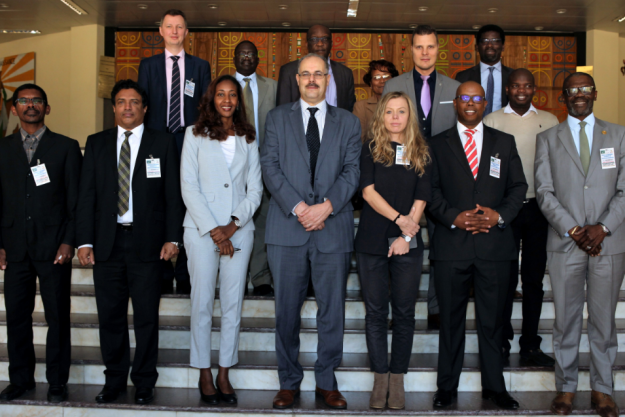
OPCW Partners Discuss Approaches towards Effective CWC Implementation in Africa
THE HAGUE, Netherlands – 22 November – Representatives of partner organisations of the Organisation for the Prohibition of Chemical Weapons (OPCW) and Africa’s Regional Economic Communities (RECs) discussed the coordination of assistance to States Parties in Africa in the implementation of the Chemical Weapons Convention (CWC) during the workshop held in Addis Ababa, Ethiopia, from 13 – 14 November.
The workshop titled “Strengthening International and Regional Partnerships for Effective CWC Implementation in Africa” was co-organised with the African Union Commission. The event raised awareness of the OPCW Africa Programme among various OPCW partner organisations, and identified implementation gaps and opportunities for building synergies among partners in providing assistance to States Parties in Africa.
OPCW Director of International Cooperation and Assistance, Mr Hamza Khelif, noted in his opening remarks that Africa remains a key region for CWC implementation. He stressed that “more concerted efforts are needed to assist OPCW Member States from the African continent build their capacity to use the mechanisms provided in the Convention to tackle the threat of chemical terrorism posed by non-State actors”.
Acting Director of the Peace and Security Department at the African Union Commission, Mr Sivuyile Bam, not only emphasised the importance of identifying gaps in assistance programmes, but also the need to discuss concrete ways on how these gaps can be addressed.
The workshop provided a platform for partners to exchange information about their activities and outline the possibilities for each organisation to contribute to the fulfilment of the Africa Programme objectives.
Similar events are expected to become a part of the OPCW’s regular activities as CWC implementation moves forward in the African region.
Background
Fifty-two Member States of the African Union comprise over one-quarter of the 192 States Parties committed to the Convention. A Memorandum of Understanding between OPCW and the African Union Commission, signed in 2006, has laid the foundation for effective national implementation of the CWC, and has increased the participation by African Member States in the OPCW’s international cooperation programmes.
As the implementing body for the Chemical Weapons Convention, the OPCW oversees the global endeavour to permanently eliminate chemical weapons. Since the Convention’s entry into force in 1997 – with its 192 States Parties – it is the most successful disarmament treaty eliminating an entire class of weapons of mass destruction.
Ninety-six per cent of all chemical weapon stockpiles declared by possessor States have been destroyed under OPCW verification. For its extensive efforts in eliminating chemical weapons, the OPCW received the 2013 Nobel Prize for Peace.
